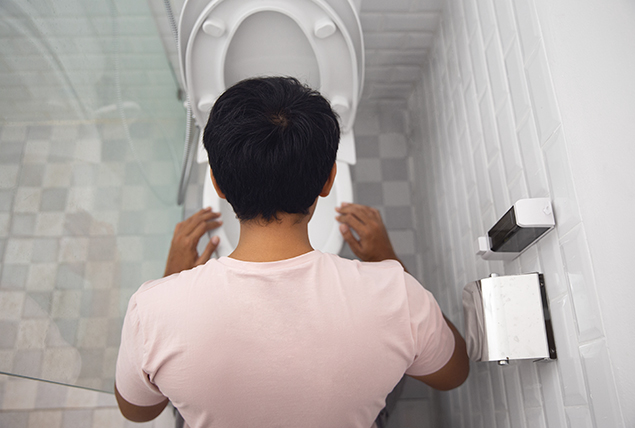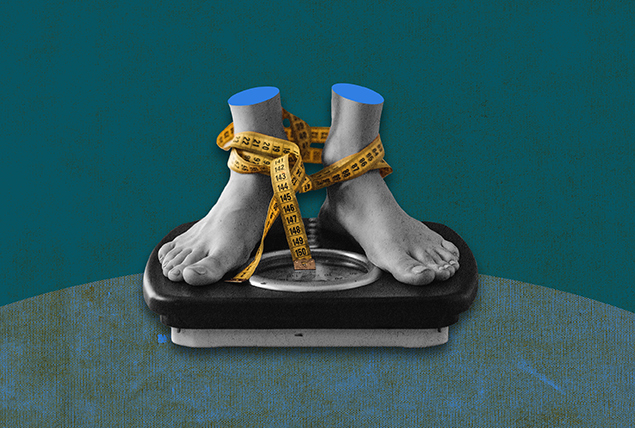Yes, Bulimia Can Affect Men's Sexual Health

Chris, a 40-year-old man, had been struggling with body image and shame when he went to see a sex therapist. The body image issues had led to a manifestation of bulimia nervosa, a potentially life-threatening eating disorder marked by overeating or binging and, commonly but not always, self-induced vomiting.
Chris's partner had made hurtful comments about him "finishing too fast" and threatened to leave the relationship because he was not "man enough," said Robyn Flores, M.S., L.M.F.T., a sex therapist and doctoral candidate who provides client care in Texas and Colorado for Respark Therapy. She worked with Chris.
Editor's note: We have changed Chris' name so Flores could speak freely about his case.
"He feared abandonment and the potential end of the relationship, so he decided to restrict his diet," Flores explained.
One patient beats his eating disorder
During this time, Chris internalized most of his emotions, fearing expressing them would push his partner away even more. He hit a point when he entered the binge-restrict cycle. He started bingeing on food, then either exercising for several hours or purging for a sense of "relief" from the feelings of shame he incurred by eating the "bad" food, Flores said.
In therapy, Flores explored how Chris' binge cycle began and what perpetuated it as she guided him in taking steps to break the cycle.
"He was initially shamed for experiencing pleasure through sex, then criticized, and experiencing pleasure with food, and was also criticized," Flores said. "He was in an invalidating relationship in which his needs for comfort and acceptance were not present."
Fortunately, through a combination of radical acceptance and mindfulness, as well as care from a registered dietitian, Chris was able to overcome his eating disorder.
What is bulimia?
Eating disorders are a psychiatric category of illnesses in which individuals have maladaptive behaviors regarding their eating, or lack thereof, or harmful behaviors that involve food intake, according to Roberto Olivardia, Ph.D., a clinical instructor of psychology at Harvard Medical School.
"Eating disorders are very dangerous," Olivardia said. "Eating disorders are psychiatric diagnoses, but they're also medical diagnoses. They absolutely have a whole host of different adverse and negative consequences."
Common eating disorders include anorexia nervosa, bulimia nervosa, binge eating disorder and avoidant restrictive food intake disorder (ARFID).
Studies show that anywhere from 25 percent to 30 percent of people with eating disorders are male, and approximately 1 percent to 1.5 percent of the United States male population will struggle with bulimia at some point in their lifetime.
"Bulimia nervosa is a condition where someone tries to achieve a certain body ideal by doing things to make up for what they've eaten," said Jason Nagata, M.D., an assistant professor of pediatrics at the University of California, San Francisco and an expert on eating disorders. "The classic bulimic behaviors in women include vomiting, fasting or use of laxatives to prevent weight gain. In men, compensatory behaviors can include excessive exercise and using muscle-building drugs or supplements."
Bulimia involves repeatedly eating large amounts of food in a short period of time. Nagata pointed out that the volume of food consumption during binge eating episodes may be larger in men than in women.
"For men, eating a lot of food in one sitting might be called a 'cheat meal' and seen as a good thing if they are trying to build muscle," Nagata said.
What causes bulimia?
The causes of bulimia are similar in men to what they are in women. That list includes a complex array of factors, according to Meghan Gillen, Ph.D., an associate professor of psychology at Penn State Abington who studies eating disorders.
Bulimia can be genetic. If a man has a family member who struggled with an eating disorder, he's more likely to have one. Feelings of depression, stress or anxiety can be contributing factors, too.
"Food can sometimes feel like a form of self-medication to ease someone's negative emotions," Gillen said.
Men with bulimia tend to be impulsive and might struggle with impulse control issues, and the disorder often co-occurs with substance use, Olivardia explained.
"It's often characterized by people who have some emotional dysregulation issues, where it's very difficult for them to manage their feelings and their emotions," he said.
What often precipitates bulimia is the dieting behavior of restricting and not eating enough.
"Then nature overrides that and says, 'We're gonna eat a lot.' And then they binge," Olivardia said.
Athletes are at higher risk for bulimia due to the weight cutting or gaining involved with certain sports. Past experiences or trauma can also contribute to the development of bulimia. For example, being teased or bullied about their body or appearance could lead them to feel worthless.
Compounding these facts is the fact that we live in a culture that dictates certain bodies are more valued and idealized, according to Olivardia.
Bulimia and sexual health
Eating disorders tend to affect sexual function. In men, eating disorders can lead to low testosterone levels and a reduced sex drive.
Low-T and libido
"When a man's body does not get enough nutrition, the body enters a starvation state, and testosterone production is reduced," Nagata said.
Bulimia can result in a low body mass index (BMI) because of purging or excessive exercise.
"Their BMI may decrease, and that can lead to lower testosterone, which can affect their libido," Gillen said. "It can also impact their sperm count as well."
Risky sexual behavior
Some eating disorder behaviors, such as vomiting, may even be associated with more sexual partners and unprotected sex.
"An explanation for why people with bulimia nervosa engage in purging behaviors is that they may be more impulsive, which can also lead to risky sexual behaviors," Nagata said. "Men who have impulsive personalities may have a higher chance of developing both disordered eating habits and engaging in more sexual behaviors."
Men who have bulimia may take muscle-building supplements and drugs such as anabolic steroids. Men who use these performance-enhancing drugs have been found to have more sexual partners and are at a higher risk of getting sexually transmitted infections (STIs) compared to men who don't use them.
Self-consciousness about sex
Because eating disorders make men feel anxious or self-conscious about their bodies, this can have a psychological impact during sex.
"That can affect men's confidence," Gillen said. "If someone is really concerned about their body, they may feel more uncomfortable in sexual situations."
Does bulimia cause infertility?
Bulimia in men is understudied and underreported. The effect bulimia has on women has received much more attention.
"I think we don't know as much about men; there's just not as much work on it," Gillen said. "For women, when they get to that lower BMI, it affects their menstrual cycles, and that has a number of implications for women's fertility and general overall health."
For men, it's not as clear-cut.
"It's much more objective for women than for men," Gillen said. "We need more research on how it impacts men's fertility."
Nagata said he's not aware of any studies specifically examining bulimia and infertility in men.
"However, eating disorders can lead to lower levels of follicle-stimulating hormone [FSH] in men, an important hormone for stimulating sperm production," he explained.
If you or a loved one are struggling with an eating disorder, Nagata recommends seeking professional help.
"Eating disorders are best supported by an interdisciplinary team, including a mental health, medical and nutrition provider," he said.


















